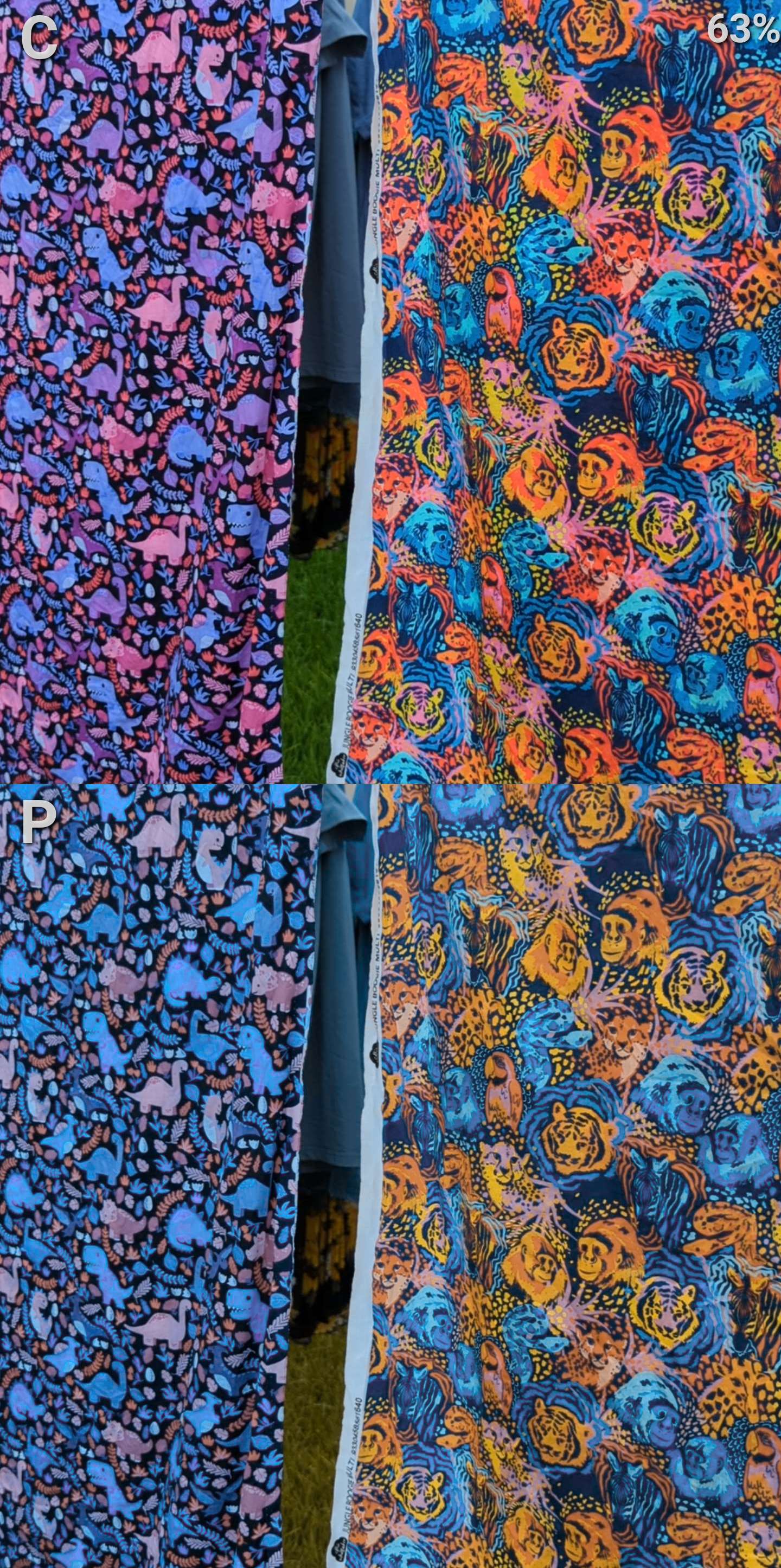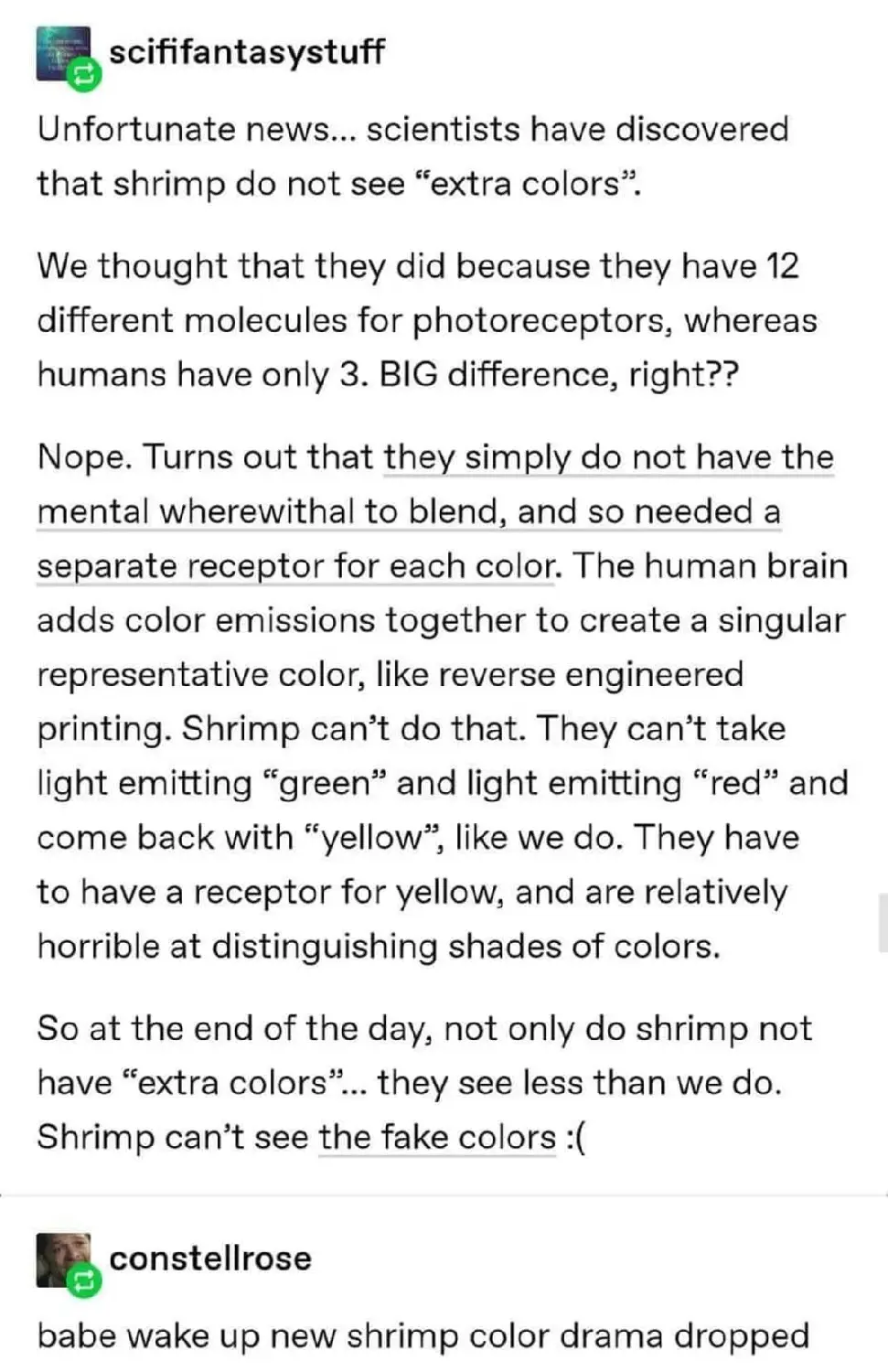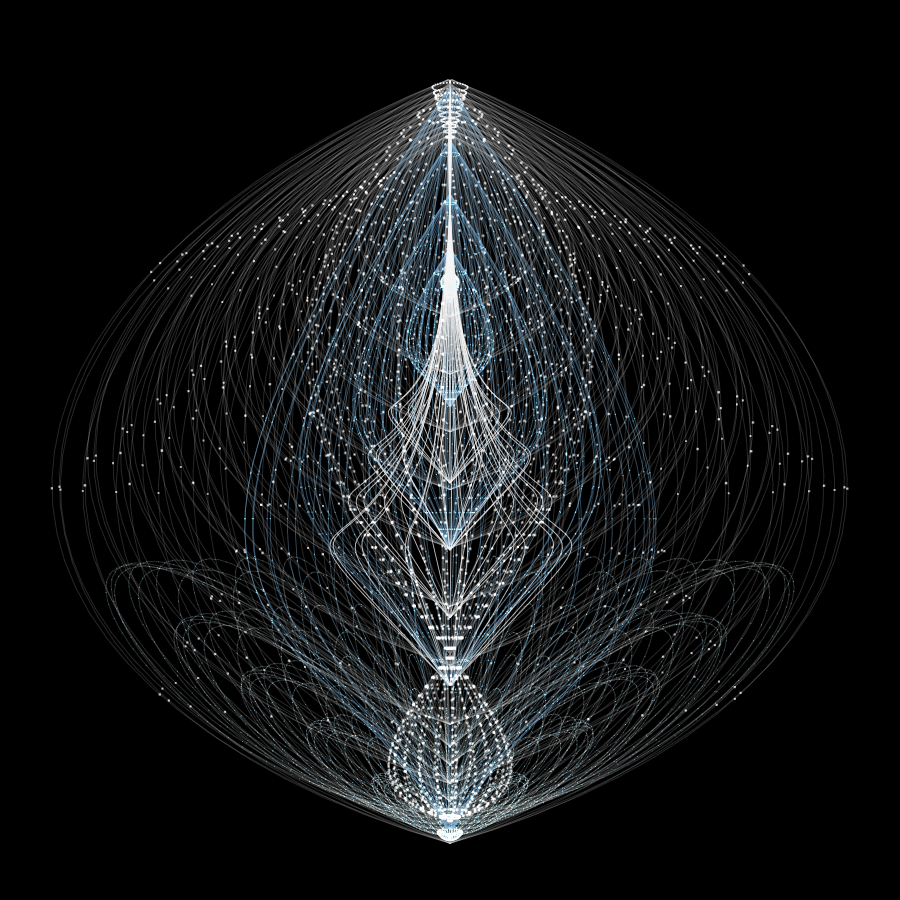I’m slightly colour blind and have an app on my phone that can simulate my deficiency. I take a photo and it shows the views side by side. I adjust it til they look the same and then show my wife (with her stupid perfect colour vision) and she can describe the difference in what I’m seeing.
On rare occasions she says what I’m seeing looks better, so it’s not all bad
Link? I can’t see shit either
I use this one https://play.google.com/store/apps/details?id=asada0.android.cvsimulator but a search for colour blind on play yields a few
Could you show us what it looks like ?
Top and bottom look the same to me, I am protan colour blind, red deficient. I see some red, but not all

Wow thank you for the follow up :) Very interesting
Interesting! What’s the name of that app?
A search on play for colour blind has a few but I use this one https://play.google.com/store/apps/details?id=asada0.android.cvsimulator
What blind animals see:
What mastodon users see:
There are two bands of color ranging from Red to Purple. The top one is labeled: “What we see” and the bottom one is labeled “What animals with a larger color range than ours see:”
The joke is that both color bands are the same because the viewer is presumed to be human, and therefore cannot perceive the extra colors.
presumed
HA HA GOOD JOKE FELLOW HUMAN.
Shouldn’t it be wider?
It is.
There are humans with a fourth color receptor in their eyes who may have a wider color range than your average person. Women only though, sorry boys.
I feel robbed
I tried and failed to explain this to people once. It’s not that a magical never before seen color exists outside our visible spectrum, its more like their red and violet ends would be shifted further along the spectrum and everything inbetween would be more differentiable. A great example is migratory birds can tell North from South by the color of the sky, because the electromagnetic field around the earth has a color gradient. It just all looks the same to us because by comparison we’re colorblind to that part of the spectrum.
But how can we know if they don’t experience different colors in the infrared/ultraviolet range?
Because what we experience as colors aren’t provided by the physical world. The physical world solely provides a light frequency. We sense that frequency, process it, and understand it as colors because evolution has resulted in that being the most advantageous for us. It’s better for us to understand what we see as colors than for example a numerical representation of the light frequency. It’s quicker to process what we see as a color than a shit ton of numbers.
Imagine a painting where instead of colors, what you see is one shade with the numerical frequencies of all the light reflecting off of it. Colors are made up in our minds. It would be nearly impossible to make sense of that.
Colors are thoughts that exist solely in our visual cortex, an entirely made up human experience. For example, magenta doesnt exist in nature. It’s what we make up in our heads when indigo and red are hit our eyes are the same time. Asking if another being sees different colors is like asking if another being thinks differently.
We can see what wavelengths their photoreceptors trigger on
Yes, but it shows that they’re reacting to it and probably experiencing the color, but it doesn’t give a hint on how the experience is. I’m falling a bit into a solipsism-like thinking, but perhaps the idea of other animals experiencing colors that we don’t isn’t absurd.
It’s not that a magical never before seen color exists outside our visible spectrum,
That is… Super disappointing. I always wanted to believe there were just-- unreal colors from out of space that some things actually could see, but we’d just never really know. I love science, dgmw; but sometimes, I hate it just as much for stripping more of the wonder out of this ugly mud ball.
Do you have a source for that magnetic field sky colour gradient thing? That’s really interesting!
Took me a moment
Mantis shrimps have the most complex eyes in the animal kingdom and have the most complex front-end for any visual system ever discovered. Compared with the three types of photoreceptor cell that humans possess in their eyes, the eyes of a mantis shrimp have between 12 and 16 types of photoreceptor cells. Furthermore, some of these stomatopods can tune the sensitivity of their long-wavelength colour vision to adapt to their environment. (Wiki)


TIL this was refuted. Instead it was determined that shrimps lack the brainpower to properly process which us why they have more photoreceptor cells. They actually see less color overall.
So, I came back to this thread after seeing another on mantis shrimp colour drama further down: apparently their extra photoreceptor variety doesn’t (might not?) increase their colour vision range because their brains can’t merge the signals like ours do.
It’s not about to see better, but seeing a wider range of colors and even polarized light. It’s like having a sniper scope with night vision, just what these critters need to capture their prey. They do not need a clear vision more than one meter. just the distance to knock out the prey with the fastest fists in the west or in the case of the Pistol shrimp, which can close its pincer with such violence to produce a plasma bubble with the effect of a small caliber revolver (the aquariums with these need reinforced glass)
Yes but the point was they might not see a wider range of colours. We interpret a whole spectrum by comparing the proportion of r/g/b; the other thread claimed they only see the colours they directly have a receptor for.
The wavelength of Magenta doesn’t actually exist. It’s our red and blue photoreceptors activating without the green ones. It blows my mind how many non-existent colors mantis shrimp can see.
While they do have many kinds of photoreceptors, and can therefore see a large range of colours, they have very limited colour resolution: https://www.nature.com/articles/nature.2014.14578
As far as I understand it, they cannot blend the different light components nearly as well as humans do (e.g. seeing red and green at the same time and deduce that is yellow).
Iirc the number is upto 5 photoreceptors, giving out 12-16 billion colors.
As clear as John Cena.











